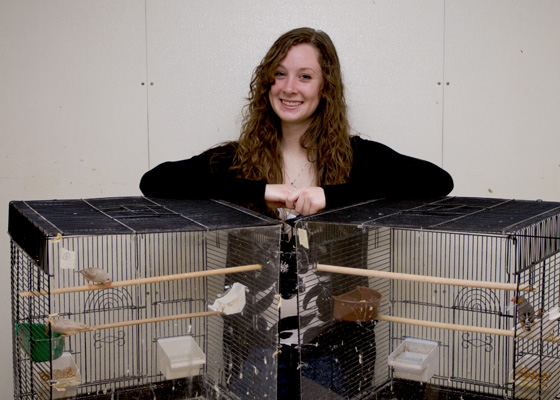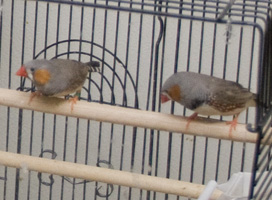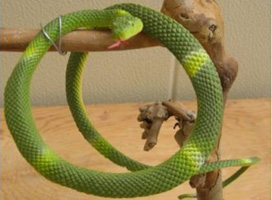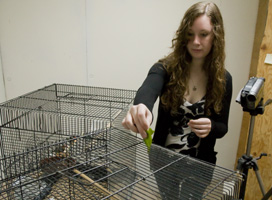

Venture Boldly


When Kelly Wiggen decided as a Knox College sophomore that she would apply to veterinary school, she initially worried about whether she had enough experience dealing with animals. But that turned out to be no problem at all, thanks largely to her undergraduate research work with dozens of birds.
"I got literally hundreds of hours of animal experience by working with zebra finches," said Wiggen, a 2011 Knox graduate studying at the University of Illinois College of Veterinary Medicine. "It was nice to be able to put on my (vet school) application that I'm not only doing research, which is a big plus, but I'm also getting animal experience."
Originally from Palatine, Illinois, Wiggen majored in biology and minored in chemistry at Knox.
As a senior, she conducted a College Honors research project that analyzed how domesticated zebra finches react to different types of predators. Zebra finches are commonly sold in pet stores in the United States, but they also live in the wild in Australia. Their predators include snakes.
Under the supervision of Jennifer Templeton, Knox associate professor of biology, Wiggen set up four experimental groups of zebra finches. She analyzed their behavior after being exposed to a snake model under different audio conditions -- an alarm call recorded from wild zebra finches (indicating danger), wild zebra finches' social calls (indicating all is well), background noise of insects and wind, or silence.
But first, she needed to identify the birds' baseline behavior. "Spinach is a treat for them, so I put spinach in the cage and timed how long it takes for them to come down and feed at the spinach and how long they spend feeding at it, in the absence of the snake, over a 10-minute trial," she said.
Later, after pairing the artificial snake with the different sounds, Wiggen observed how the birds behaved when the snake entered their environment. "My hypothesis was that for the group that had heard the playback of the alarm call while they saw the snake, we would see the greatest reluctance to land and feed at the spinach in the presence of the snake. This would show that they had learned to be afraid of it."
 Surprisingly, Wiggen said, the birds exposed to background noise learned to be the most afraid of the snake, and the birds exposed to the alarm call were the least afraid. The results indicate that domesticated zebra finches have lost the ability to recognize alarm calls, or that they can gain the ability only in the wild.
Surprisingly, Wiggen said, the birds exposed to background noise learned to be the most afraid of the snake, and the birds exposed to the alarm call were the least afraid. The results indicate that domesticated zebra finches have lost the ability to recognize alarm calls, or that they can gain the ability only in the wild.
Wiggen created a poster about the research. She and Templeton presented it in July 2011 at a joint meeting of the International Ethological Congress and the Animal Behavior Society in Bloomington, Indiana.
Despite the unexpected results, Wiggen said she learned a great deal.
"At a lot of undergraduate institutions, you don't get to have this kind of opportunity to do research and to choose your own project, essentially," she said. "I got to figure out how to design an experiment with all my bases covered. I learned how to control for variables that I wasn't initially expecting."
"I got to experience general frustration with research," Wiggen added, laughing. "Animals are very unpredictable and tend to be uncooperative, which has been frustrating, but it's been a great learning experience. Just because I plan to start trials on Tuesday doesn't mean the birds are actually going to want to start trials on Tuesday. I had to learn to be flexible with my subjects and adjust as I went."
Wiggen's other Knox activities included singing in the Knox College Choir and the Chamber Singers, serving on the Choir Board, and working as a teaching assistant for several chemistry and biology classes. She also job-shadowed at a veterinary clinic in Galesburg.
When Wiggen was a high school student figuring out where to attend college, she applied to Knox mainly because her father, Mike Wiggen, graduated from Knox in 1977.
Choosing Knox "was a fantastic decision," she said. "I met people I'm going to be in touch with for the rest of my life -- both students and professors. I just don't think you can get that at other schools."
Published on August 31, 2011